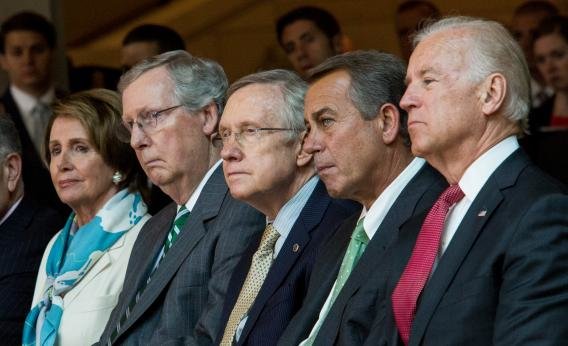
“Although partisan polarization may have Washington deadlocked, there are worse things than a deadlocked Washington — such as a unified Washington marching boldly forward toward disaster in Vietnam when the Gulf of Tonkin Resolution was passed in 1964 (with a vote of 416- 0 in the House, 88-2 in the Senate).”
P.J. O’Rourke, “How the Boomers Ruined/Saved Everything,”
AARP magazine, 12/2013-1/2014
Writer P.J. O’Rourke makes an excellent point. Except for one thing: Our current “partisan deadlock” is not deadlock at all.
In fact, on all the important matters, the two parties agree. Raising the debt limit? Yes. Raising taxes? Yes. Increasing spending, along with the debt, into a fictitious infinity? Yes. Increasing regulations and government power over nearly all activities of daily life, way outside the parameters of the original U.S. Constitution? Of course.
The two parties differ only in style and the precise cost of our bankruptcy. But in all substantive respects, the most recent budget deal by Congress is the fiscal equivalent of the Gulf of Tonkin “bold” movement towards disaster.
I recently read a story about Ronald Reagan’s presidency. Whether the story is true or not isn’t the point. It illustrates where most of America is.
According to the story, Reagan was trying to cut the rate of government spending outside of military and defense. He approved the final budget to be sent to Congress. However, in meetings with his advisors they looked at the domestic budget cuts line-by-line. When Reagan started to see cuts in particular programs, such as school lunches, he stated, “We’ll just have to put that one back in.” (Keep in mind that Reagan’s presidency, while flawed and contradictory, was a Jeffersonian nirvana compared to what either of the parties offer us now.)
Reagan’s contradiction in that story is similar to the contradiction of a majority of Americans today. In poll after poll, a comfortable majority decry the spiraling national debt and increased government spending and taxes. Yet in actual practice, a great majority will oppose just about any specific cuts. It’s not only Social Security and Medicare, which potentially affect everyone. It’s agricultural subsidies, foreign aid, and all manner of pet projects for Senators and Congressmen entrenched in power using other people’s money.
The lesson here? Political and budget issues cannot be solved without ideology or philosophy. Ideology or philosophy tell you what should or should not be put into the budget, and why. In a fuzzy kind of way, Ronald Reagan held the ideology that the federal government should limit itself to the basics, such as defense. But when push came to shove, the fuzziness of his ideology came home to roost and we ended up with more government growth than we otherwise would have had.
With someone like Barack Obama, there is no fuzziness. There are no compromises. According to him, the purpose of government is to transfer wealth. Period. He does not wobble on his socialism. He has stood up to the Tea Party without wavering, and the conventional Republican leadership caved more quickly than even their critics would have expected (suggesting they were relieved, if anything). That’s why we have business as usual, only more than ever before, as our fiscal liberties suffocate under the weight of nanny-government interference.
And with censorship looming on the horizon, in the form of FCC bureaucrats showing up at newsrooms throughout the nation, what kind of principled opposition can Obama expect, if Republican rolling over on fiscal matters is any guide?
O’Rourke makes an eloquent point in principle. If we actually had a philosophically consistent party with the integrity to oppose Obama and the advocates of unlimited government, it would mean something. Truly divided government would paralyze the federal bureaucracy, and this would be a beautiful thing. Why? Because government is the problem, not the solution, aside from the requirement for a military. Not only is most of what the federal government does useless and a waste of money; it’s damaging to economic growth and liberty.
What about the Tea Party? It was always something of an abstraction. The Tea Party is only a subset of the Republican Party, and the Republican Party has shunned them for the comforts of Washington power and the love of cultural celebrity elites (which they’ll never receive, because the Democrats are much better at this kind of thing). Sadly, many elements of the Tea Party are caught up in fixations on homosexuality and abortion, instead of the really important things (economics, defense) upon which civilizations truly rise or fall.
In the end, it’s the people, led by their “intellectuals,” who decide the course of the nation, at least in a democratic republic. However, the people and their intellectuals have drifted toward the Big Government regulatory-entitlement state.
Liberty is the social and political equivalent of oxygen. A society can no more function without freedom than an individual can thrive without air to breathe. We permit this sinister and incompetent man in the White House to lead the charge to gradual dictatorship, not because we have succumbed, but merely because most of us are too indifferent to speak out against it.
Be sure to “friend” Dr. Hurd on Facebook. Search under “Michael Hurd” (Rehoboth Beach DE). Get up-to-the-minute postings, recommended articles and links, and engage in back-and-forth discussion with Dr. Hurd on topics of interest.
